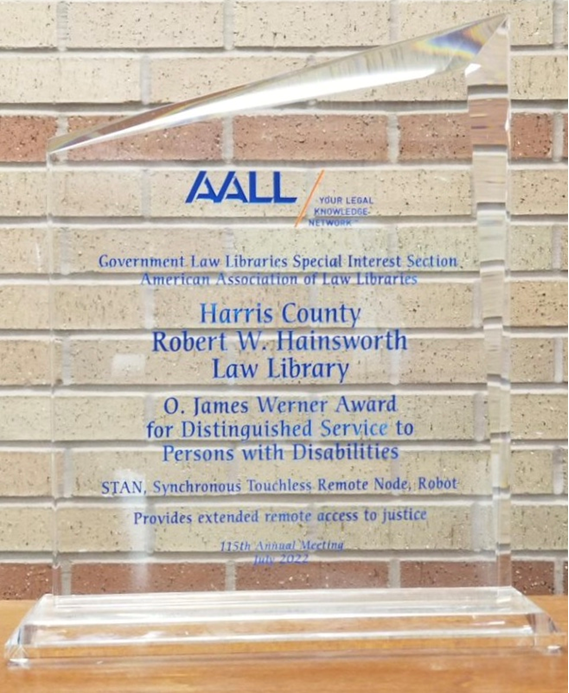The office of the Harris County District Clerk serves as the primary custodian of records and court documents for the county’s District Courts. Self-represented litigants can start a case by filing their legal forms in person at 201 Caroline or electronically through efiletexas.gov.
La oficina de la Secretaria del Distrito se encarga de mantener los archivos de los tribunales del Distrito. Los litigantes Pro Se (personas autorepresentadas y sin asesoramiento legal) pueden presentar formularios en persona o de manera electrónica con el sistema de efiletexas.gov.
Read moreThe Harris County Robert W. Hainsworth Law Library received three distinguished awards at the 2022 American Association of Law Libraries Annual Meeting, held in Denver, Colorado, earlier this month. The Law Library is grateful to be recognized by our distinguished law library peers, and humbled to serve the profession of law librarianship alongside a remarkable community of advocates for access to justice and legal information.
Read moreEl sistema de tribunales en el condado de Harris está compuesto de diferentes niveles y cada nivel maneja diferentes tipos de casos. Estos tribunales juegan un papel importante en el sistema judicial del estado de Texas.
Read moreWrits. We’ve all heard of them. There’s the writ of certiorari, the writ of habeas corpus, and the writ of mandamus, just to name a few. But what exactly is a writ and what does it do? Simply put, a writ is “an order issued by a legal authority with administrative or judicial powers, typically a court.” Historically, in the common law, writs were used to convey real property, grant privileges or rights, and to convey information. They were also written executive directives from the king, instruments by which the king could intervene into matters that were not resolved by feudal courts. Later, writs evolved, adopting a more judicial nature, acting as summonses or the initial documents in legal matters or as an order commanding a person to do something or refrain from doing something.
Read moreMany pro se litigants have questions about the legal terms “uncontested” and “contested.” The most common case where these legal terms are used are in divorces – for example, a “contested divorce” or “uncontested divorce.”
Uncontested or non-contested cases are cases that can be finished by agreement because both parties agree about all the issues. An uncontested divorce is “when the parties are not fighting each other about the divorce itself or the terms of their separation.”
Read more



